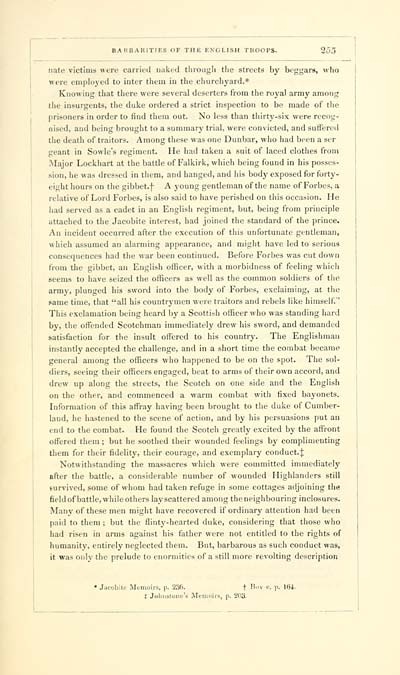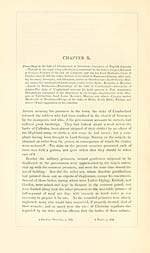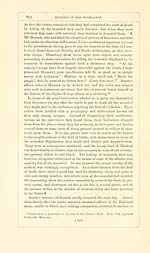Download files
Complete book:
Individual page:
Thumbnail gallery: Grid view | List view

BARBARITIES OF THE ENGLISH TIIOOPS. 255
(late victims were carried naked througli tlie streets by beggars, who
were employed to inter ihein in the churchyard.*
Knowing that there were several deserters from the royal army amoiii;
the insurgents, tlie duke ordered a strict inspection to be made of the
prisoners in order to tirid thtin out. No less than thirty-six were recog-
nised, and being brought to a summary trial, were convicted, and suffered
the death of traitors. Among these was one Dunbar, who had bpen a ser
geant in Sowle's regiment. He had taken a suit of laced clothes from
Major Lockhart at the battle of Falkirk, whicli being found in his posses-
sion, he was dressed in them, and hanged, and liis body exposed for forty-
eight hours on the gibbet.f A young gentleman of the name of Forbes, a
relative of Lord Forties, is also said to have perished on this occasion. He
had served as a cadet in an English regiment, but, being from principle
attached to the Jacobite interest, had joined the standard of the prince.
An incident occurred after the execution of this unfortunate gentleman,
wliich assumed an alarming appearance, and might have led to serious
consequences had the war been continued. Before Forbes was cut down
from the gibbet, an English officer, witli a morbidness of feeling which
seems to have seized the officers as well as the common soldiers of the
army, plunged his sword into the body of Forbes, exclaiming, at the
same time, that "all his countrymen were traitors and rebels like himself."
This exclamation being heard by a Scottish officer who was standing hard
by, the offended Scotchman immediately drew his sword, and demanded
satisfaction for the insult offered to his country. The Englishman
instantly accepted the challenge, and in a short time the combat became
general among the officers who happened to be on the spot. The sol-
diers, seeing their officers engaged, beat to arms of their own accord, and
drew up along the streets, the Scotch on one side and the English
on the other, and commenced a warm combat with fixed bayonets.
Information of this affray having been brought to the duke of Cumber-
land, he hastened to the scene of action, and by his persuasions put an
end to the combat. He found the Scotch greatly excited by the affront
offered them ; but he soothed their wounded feelings by complimenting
them for their fidelity, their courage, and exemplary conduct.^
Notwithstanding the massacres which were committed immediately
after the battle, a considerable number of wounded Highlanders still
survived, some of whom had taken refuge in some cottages adjoining the
field of battle, while others lay scattered among the neighbouring inclosures.
Many of these men might have recovered if ordinary attention had been
paid to them ; but the flinty-hearted duke, considering that those who
had risen in arms against his father were not entitled to the rights of
humanity, entirely neglected them. But, barbarous as such conduct was,
it was only the prelude to enormities of a still more revolting description
• Jacobite Memoirs, p. 2,%. t f'"v e, p. 16i.
t Joliiislone's Aleriioirs, p. 203.
(late victims were carried naked througli tlie streets by beggars, who
were employed to inter ihein in the churchyard.*
Knowing that there were several deserters from the royal army amoiii;
the insurgents, tlie duke ordered a strict inspection to be made of the
prisoners in order to tirid thtin out. No less than thirty-six were recog-
nised, and being brought to a summary trial, were convicted, and suffered
the death of traitors. Among these was one Dunbar, who had bpen a ser
geant in Sowle's regiment. He had taken a suit of laced clothes from
Major Lockhart at the battle of Falkirk, whicli being found in his posses-
sion, he was dressed in them, and hanged, and liis body exposed for forty-
eight hours on the gibbet.f A young gentleman of the name of Forbes, a
relative of Lord Forties, is also said to have perished on this occasion. He
had served as a cadet in an English regiment, but, being from principle
attached to the Jacobite interest, had joined the standard of the prince.
An incident occurred after the execution of this unfortunate gentleman,
wliich assumed an alarming appearance, and might have led to serious
consequences had the war been continued. Before Forbes was cut down
from the gibbet, an English officer, witli a morbidness of feeling which
seems to have seized the officers as well as the common soldiers of the
army, plunged his sword into the body of Forbes, exclaiming, at the
same time, that "all his countrymen were traitors and rebels like himself."
This exclamation being heard by a Scottish officer who was standing hard
by, the offended Scotchman immediately drew his sword, and demanded
satisfaction for the insult offered to his country. The Englishman
instantly accepted the challenge, and in a short time the combat became
general among the officers who happened to be on the spot. The sol-
diers, seeing their officers engaged, beat to arms of their own accord, and
drew up along the streets, the Scotch on one side and the English
on the other, and commenced a warm combat with fixed bayonets.
Information of this affray having been brought to the duke of Cumber-
land, he hastened to the scene of action, and by his persuasions put an
end to the combat. He found the Scotch greatly excited by the affront
offered them ; but he soothed their wounded feelings by complimenting
them for their fidelity, their courage, and exemplary conduct.^
Notwithstanding the massacres which were committed immediately
after the battle, a considerable number of wounded Highlanders still
survived, some of whom had taken refuge in some cottages adjoining the
field of battle, while others lay scattered among the neighbouring inclosures.
Many of these men might have recovered if ordinary attention had been
paid to them ; but the flinty-hearted duke, considering that those who
had risen in arms against his father were not entitled to the rights of
humanity, entirely neglected them. But, barbarous as such conduct was,
it was only the prelude to enormities of a still more revolting description
• Jacobite Memoirs, p. 2,%. t f'"v e, p. 16i.
t Joliiislone's Aleriioirs, p. 203.
Set display mode to: Large image | Transcription
Images and transcriptions on this page, including medium image downloads, may be used under the Creative Commons Attribution 4.0 International Licence unless otherwise stated. ![]()
| Early Gaelic Book Collections > Ossian Collection > History of the Highlands and of the Highland clans > Volume 3 > (293) |
|---|
| Permanent URL | https://digital.nls.uk/79655938 |
|---|
| Description | Vol. III. |
|---|---|
| Shelfmark | Oss.249 |
| Attribution and copyright: |
|
| Description | Selected books from the Ossian Collection of 327 volumes, originally assembled by J. Norman Methven of Perth. Different editions and translations of James MacPherson's epic poem 'Ossian', some with a map of the 'Kingdom of Connor'. Also secondary material relating to Ossianic poetry and the Ossian controversy. |
|---|
| Description | Selected items from five 'Special and Named Printed Collections'. Includes books in Gaelic and other Celtic languages, works about the Gaels, their languages, literature, culture and history. |
|---|

